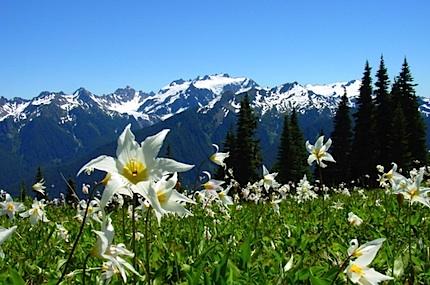Mention wilderness stewardship and Olympic National Park, and people take an interest. That's why the park has rescheduled a public meeting to discuss its Wilderness Stewardship Plan -- so it can accommodate a larger crowd than expected.
A public meeting scheduled for this Thursday in Amanda Park near Lake Crescent has been pushed back a bit and moved to a larger facility to accommodate the public. The meeting, originally scheduled from 4 p.m. to 6 p.m. at the Amanda Park Library, is now scheduled to take place from 5 p.m. to 7 p.m. at the Lake Quinault School gymnasium located at 6130 US Hwy 101.
The public is invited to drop by any time between 5 p.m. and 7 p.m. to discuss the plan with park staff.
The park is also scheduling additional workshops to be held in Port Townsend, Olympia, and Aberdeen. The Port Townsend public meeting is scheduled for February 27, from 5 p.m. to 7 p.m. at the Cotton Building located at 607 Water Street. Meetings in Olympia and Aberdeen will be scheduled for March; dates and times are still to be determined.
"I am very pleased we have received such broad public interest," said Olympic Superintendent Sarah Creachbaum. “Public input is essential in developing the best possible plan.”
But the park's approach to wilderness stewardship is not without a measure of controversy. The park initiated this project in 1990, and returned to it again in 1994, and again in 1999. In 2002, it proposed to address wilderness stewardship in its General Management Plan, but that approach was withdrawn.
A wilderness management planner position at Olympic National Park was funded in 2010 and 2011 by the Park Service's Washington headquarters, but that funding was cut in 2012, so the process is restarting again under a new planner.
While all this planning has been under way, the park has been operating under its 1980 Backcountry Management Plan and its 1992 addendum.
More information about the park's Wilderness Stewardship Plan, public meetings, and planning process, including a public scoping newsletter, is available online at this site. Comments may also be submitted at that website or mailed to:
Superintendent Sarah Creachbaum
Attn: Wilderness Stewardship Plan
Olympic National Park
600 East Park Avenue
Port Angeles, WA 98362
Ninety-five percent of Olympic National Park was designated as wilderness in 1988, and is part of the National Wilderness Preservation System. The Wilderness Stewardship Plan will be developed in accordance with the Wilderness Act of 1964 and analyzed through an Environmental Impact Statement (EIS) process. In the coming weeks, a Notice of Intent to Prepare an EIS will be published in the Federal Register. The public comment period will continue for 60 days after the Federal Register notice is published.




Comments
marmot, that is one excellent summary of the Wilderness Act. Thank you very much.
Marmot, apologies for not seeing and replying earlier to your belated comment.
Your understanding of the Wilderness Act seems to contradict the wording of the Act itself, which cites recreation, scenic and historic values as among the values defining Wilderness, and in Section 4 states designation as Wilderness "shall in no manner lower the standards evolved for the use or preservation" provided by the NPS Organic Act "for the use and enjoyment of the people" and by historic preservation laws.
Your understanding of the legislative intent of Olympic Wilderness seems at direct odds with that of the sponsor of the 1988 Washington Parks Wilderness Act which designated it. Senator Dan Evans testified "designation of the park as wilderness by this act should not, in and of itself, be utilized as justification for removal of any of these structures from the park. Some of the structures may need to be removed for the purposes of environmental protection of the park. For others, repairs and stabilization may be warranted to insure the preservation of their historic integrity. Others may serve a substantial public purpose and should be retained for their benefits to public use." - 134 Cong. Rec. S16519 (daily ed. October 18, 1988) (statement of Sen. Evans).
Your statement that Wilderness management "does not require public comment, like NEPA" is amazing, as Olympic National Park is currently conducting a Wilderness Stewardship Plan http://parkplanning.nps.gov/projectHome.cfm?projectId=29224 which is explicitly required by law!
Your understanding of the intent of Wilderness seems at odds with that of The Wilderness Society, which endorses the Green Mountain Lookout Heritage Preservation Act. http://wilderness.org/sites/default/files/GML%20Factsheet_061913_FINAL.pdf
There's a simple explanation for all these discrepancies, Marmot. You've failed to recall that America is a representative democracy. Wilderness exists due to acts passed with bipartisan support and based upon public consensus. Tear that apart with appeal to a "purist manifesto", and you destroy the very foundation upon which current and future Wildernesses are built.